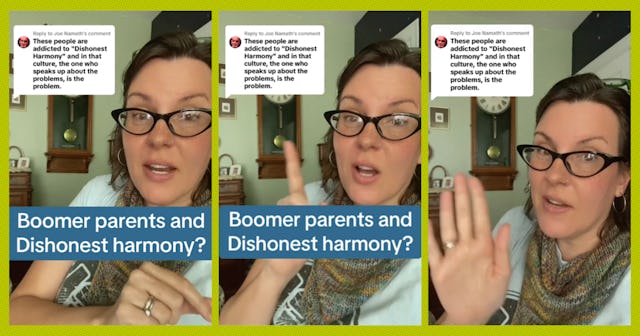A Mom Explained “Dishonest Harmony,” A Toxic Parenting Style Common With Boomers
Many of our parents thought it was more important to keep up appearances than to be open and honest.

Don’t rock the boat. Go with the flow. Don’t make waves. Play by the book. Roll with the punches. For the Boomer generation, keeping up appearances was an important part of existing in society. But a lifetime of sweeping the ugly stuff under the rug can take its toll — and many of their Gen X and Millennial kids suffered for it.
Now, the term “dishonest harmony” is resonating big time with parents in their 30s and 40s who are looking back on their childhoods and trying to do things differently. After being raised to deny our experiences and emotions, it turns out a lot of us have been desperately seeking validation, and Angela Baker delivered it on her TikTok account, @ParkRosePermaculture.
She posted the video in response to a comment that read, “These people are addicted to ‘Dishonest Harmony’ and in that culture, the one who speaks up about the problems, is the problem.”
Baker begins, “Fellow Gen X and millennials, let's talk about our parents and their need for dishonest harmony.”
An invitation to talk about our parents? We’re in.
Referencing online interactions, she says, “When I've been trying to talk about the toxic ways that we were parented as kids, I get a lot of boomers telling me to be quiet, telling me, ‘Stop talking about it. We don't need to hear about it. Move on. Be quiet.’”
According to Baker, this dismissive attitude reveals something deeper. “What that’s showing is their lack of ability to handle the distress that they feel when we talk openly about uncomfortable things,” she says. “What they want is dishonest harmony rather than honest conflict.”
What does dishonest harmony look like in practice? “Keep quiet about these hard issues. Suppress your pain, suppress your trauma. Definitely don't talk openly about it so that you can learn to heal and break the cycle,” she explains. “What matters most is that we have the appearance of harmony, even if there's nothing harmonious under the surface.”
Side-effects of this mindset may include sarcasm, passive aggression, denial and substance abuse...but we won’t ruin dinner by getting into it.
“The desire of boomer parents to have this perception that everything was sweet and hunky dory, rather than prioritizing the needs of their kids, is what drove a lot of the toxic parenting we experienced.”
Feel validated yet? Tiktok viewers did.
“THANK YOU SO MUCH! I'm a 49 yo biker sitting in my bedroom crying right now. You just put a name to my darkness!”
Another comment read, “My boomer parents would rather never speak to me again then admit everything that they’ve done.”
The topic also brought out plenty of people who are ending the cycle.
One said, “This is EXACTLY my family dynamic. I’m the problem because I won’t remain quiet. Not anymore. Not again.”
We are ready for more authenticity. “My dad gets triggered and angry if I respond to ‘How are you?’ with anything other than energetic happiness. I’ve been told ‘Don't rock the boat,’ so many times. The toxic positivity is so exhausting and emotionally squashing.”
In defense of Baby Boomers, there was probably an instinct to protect their kids from the scary chaos of emotions the only way they learned to protect themselves. Generally raised to be seen and not heard, boomers internalized the idea that soldiering on was the best way to contribute to a functioning family unit. Maybe they deserve a little validation too.
Enter Gen X and Millennials, products of cultures where our individuality matters and we feel empowered (or entitled, depending who you ask) to change what we don’t like. The friction between us and our parents makes sense.
Baker spoke to Scary Mommy about dishonest harmony and the response she’s gotten from her video.
“Dishonest harmony feels like a game, a game that I can't play very well and it has always been frustrating for me to try to communicate with people who need to play that way,” Baker shared. “Why can't we just say what we mean? Everyone can see the elephant in the room — why are we pretending that we can't?”
In her household, Baker works to avoid dishonest harmony. For example, she shares, “My kids are always free to tell me what they are thinking without any fear of punishment. My kids are never going to get in trouble for being honest. Creating a safe environment where folks can say the hard things and work through difficult conversations is really important to breaking the cycle of dishonest harmony.”
“I was actually really shocked by the video response and how universal this experience is,” she told us. It was surprising, “how wounded people were by being raised in homes like this. How they felt gaslit and confused by people who were supposed to love and guide them. “It gave me a window into how much people crave honesty and authenticity, and how much skill building we need to do as a society.”
She posted a response video to share more of her reflections and feelings.
Looking toward the future, she’s been considering, “what society would be like if we could cultivate safety in our relationships, to have difficult conversations and work through conflict, rather than avoiding it and building resentment.”
Awareness of dishonest harmony is just one way to work on emotional intelligence and to improve our relationships. We’re healing ourselves in hopes that we can, as Baker put it, “Spare future generations from the trauma that we’ve had to work through.”
As parents, we have the opportunity to get our children comfortable with discomfort. They will inherit a world that needs a lot of problem solving so, as Baker reiterates, “Any way we can reduce their burden, we need to.”